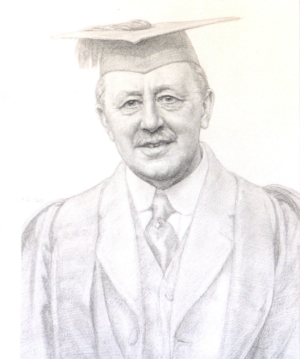The Hadley collection on Napoleon and the French Revolution held in Pembroke College Library is a good example of the sort of little-used resource which the European Collections blog is trying to make better known. William Sheldon Hadley (1859-1927) spent his entire career at Cambridge. He came up to Pembroke to read classics, and became Master of the College thirty-four years later, holding the post until his death in 1927.

Cultural historian Tom Stammers, a lecturer in the Department of History at Durham, describes in the following paragraphs why the Hadley material is of such interest.
***
The Hadley collection is a precious snapshot of how the French Revolution was understood in the opening decades of the twentieth century, with strength in four key areas. The classics of nineteenth-century historiography are well represented, the axis of classic interpretations that runs from Madame de Staël, François Mignet and Adolphe Thiers in the 1820s down to Jules Michelet and Edgar Quinet at mid century and then on to the ‘orthodox’, canonical histories produced by Alphonse Aulard. The collection thus offers a valuable overview of how the historiography developed across the nineteenth century. These republican benchmarks are joined by a host of less celebrated, more partisan apologies for particular leaders (such as Ernest Hamel’s rehabilitation of Robespierre) together with some rival conservative polemics.

Such seminal interpretations are complemented by a smaller but revealing quantity of texts written at almost the same moment as the events of the Revolution itself. There is a range of valuable journalism from the 1790s, such as the early years of Révolutions de Paris, the illustrated periodical edited by Louis Prudhomme, as well as a series of interventions by the émigré intriguer Peltier (the subject of recent research by Simon Burrows). There is an impressive run of the Moniteur Universel newspaper, reprinted at the close of the nineteenth century. And then there are the histories written by those who were contemporary with the events they described, like the hostile émigré writers Malouet and Mallet du Pan, the histrionic conspiracy theorist Abbé Barruel, and the unapologetically radical Parisian author Dulaure. These narrative histories are joined by an exceptional range of memoirs and reminiscences, some bogus, some authentic. The reliability of several of these accounts is still contested. They include the classic memoirs which helped commemorate some of the Revolution’s victims (including Madame Campan on Marie-Antoinette and Cléry the valet of Louis XVI, recalling the king’s last days in the Temple prison). But there are also memoirs by Jacobins and regicides (several written from exile after 1815) and other significant manuscripts that could only be republished under the Third Republic.

The material on the 1790s is joined by a huge quantity of documents related to Napoleon, both the memoirs that established his reputation after his death on St Helena (the famous Las Cases Memorial) but also reminiscences from devoted followers and comrades. There are also the important major histories produced on Napoleon in the nineteenth century by authors such as Masson. This extensive Napoleonic bibliography includes a large quantity of campaign memoirs from the Peninsular War and related to Nelson and Wellington as leaders. Lastly, it should be stressed that much of the Hadley material is transnational in focus. While the seminal French texts are all present, there are also echoes of how the Revolution was perceived by British observers at the time. Helen Maria Williams was actually living in France when she wrote her letters. Those who visited as tourists in 1802 or 1814 recalled how far the Revolution had transformed the French capital. But there are also a variety of tracts issued by conservative, anti-revolutionary groups (such as the brilliant Anti-Jacobin) as well as speeches and polemics by leading British statesmen wrestling with the revolutionary challenge, such as Windham, Fox and Canning. In short, the collection is of immense use for those interested in contemporary verdicts on the French Revolutionary era; how this era was defined in the first century of retrospect, which in turn meant defining the republican heritage; and how these tumultuous events produced echoes outside France’s borders and launched a virulent counter-attack from across the Channel.
Guest author: Tom Stammers, University of Durham
***
A checklist of titles appears on the Pembroke College Library website, but there are currently no records for the material on Newton or LibrarySearch. The books can be consulted by appointment with the College Librarian, Patricia Aske.


It is very good to have this collection better known – glad you have included this in your series.